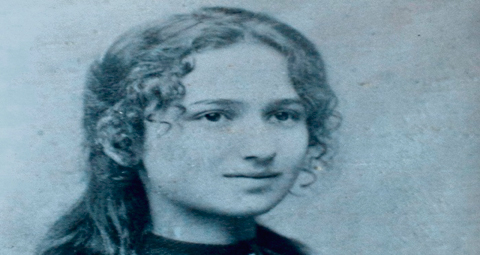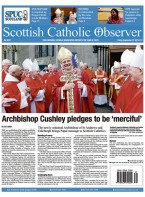September 13 | ![]() 0 COMMENTS
0 COMMENTS ![]() print
print

Faith needs to look deeper than what happens on the surface
— Fr Ronald Rolhesier
God writes straight with crooked lines. That axiom sounds clever, but is there real truth or depth to it? Can good ever really arise out of evil? Do love, truth, and justice ever work out through hatred, lies, and injustice? Do crooked lines really straighten?
The answer to those questions will invariably be negative when we look at the surface of things; but faith is never predicated on how things look on the surface. Faith, as Jim Wallis is fond of saying, doesn’t base itself upon the evidence. Rather faith looks at the word of God and then waits for the evidence to change. It also sees that deeper, under the surface, error is often at the service of truth.
We see a poignant expression of this in a poem, Meditation, written by Raissa Maritain. The poem, powerful in itself, becomes more powerful as an expression of faith when we know its background. This wasn’t a simple expression of faith in some abstract dark time. The dark times were particularly real to the poet.
Raissa, a convert to Catholicism from Judaism, had always retained a deep love for and connection to her Jewish roots. She described herself as a Christian with a Jewish heart. Now, in 1936 when she wrote this poem, she was witnessing the ascent of Adolf Hitler and Nazism in Europe, was hearing first-hand of the accounts of Jews, some of whom were personal friends, being killed in Europe, especially in Poland, and she felt herself, a Jew, threatened and was acquiring the necessary papers to flee France for the US. Her world was crumpling, her friends were dying, and she was scurrying for her personal safety. Evil was on the ascent and all the trusted political and social powers seemed to be either crushed by it or acquiescing to it. Within that crushing context, she wrote this poem:
Darkness from below, darkness from the heights;
Beneath the Archangel’s black wing
The divine plan unfolds.
Infinite paradox of the creation:
Eternity is being built with time,
And good-imperishable- with evil’s assistance.
Mankind trudges along toward justice
Through the lazy curves of iniquity,
Today’s error is at the service
Of truth to come;
The bit of good,
Seemingly powerless to vanquish
The misfortune of days,
Keeps on being the seed
Of Love’s everlasting tree.
With 70 years of hindsight, we can see that her faith was well founded. In spite of evil, God does continue to work, God’s plan does continue to unfold, and our very misfortunes become part of the growth of love, truth, and justice. But this is mostly not evident on the surface of things because, there, we are forever too focused on the big movements of power, politically, socially, economically, and religiously. We are forever looking at the big players and trying to read God’s movements there.
However, as Maritain’s poem makes evident, God’s providence often, perhaps mostly, occurs outside of what is happening visibly inside the seemingly important political, social, and ecclesial structures. That is why often God’s providence is not very evident. It is hidden because God often bypasses the places where we are looking.
When Maritain (above) affirms that the divine plan unfolds in hidden places, she’s echoing how the Evangelist, Luke, introduces John the Baptist in his Gospel. He introduces John by, first, naming all the important political and religious figures of the time—Tiberius, Pontius Pilate, Herod, Philip, Lysanias, Annas, and Caiaphas—and then telling us that the word of God bypassed them all and went instead to John, an obscure eccentric, in the desert. How shocking that is would become apparent to us if a religious writer today were to name all the important world leaders and all the important Church officials of our day, including the Pope, and then point out that God’s Word is bypassing them and going out instead to an unknown monk inside some obscure monastery. But we would find that hard to believe, do find that hard to believe, and that incredulity mostly blocks us from seeing where God’s providence is working at a deeper place.
Our world, Teilhard de Chardin says, is an immense groping, an immense search that can only progress at the cost of many failures and much human suffering. But, in his view, our sufferings are not useless. In our suffering, he affirms, we help pay the price of universal progress and triumph. Our sufferings, whatever their nature, are noble. They help bring about progress in the very world that crushes and sacrifices them.
The divine plan often unfolds under a dark wing, today’s error is at the service of tomorrow’s truth, and God’s providence often bypasses the structures of power. And so our faith needs to look deeper than what is happening on the surface, our hope needs to ground itself on something beyond what’s on the daily news, and our charity needs to be less fearful and less paranoid. God is always alive and working underneath. Nothing will be lost of our efforts and sufferings, even of our failure and errors.
—Fr Ronald Rolheiser is a Catholic priest and member of the Missionary Oblates of Mary
Immaculate. He is president of the Oblate School of Theology in San Antonio, Texas. Email him at: [email protected]











